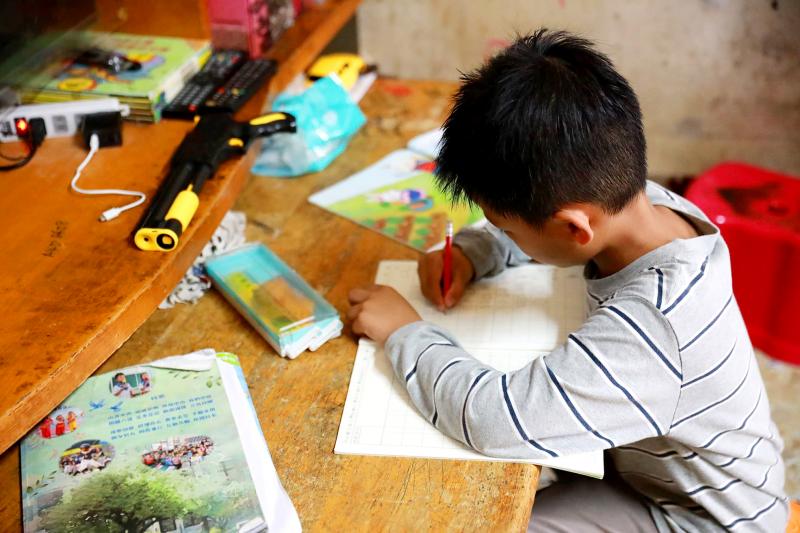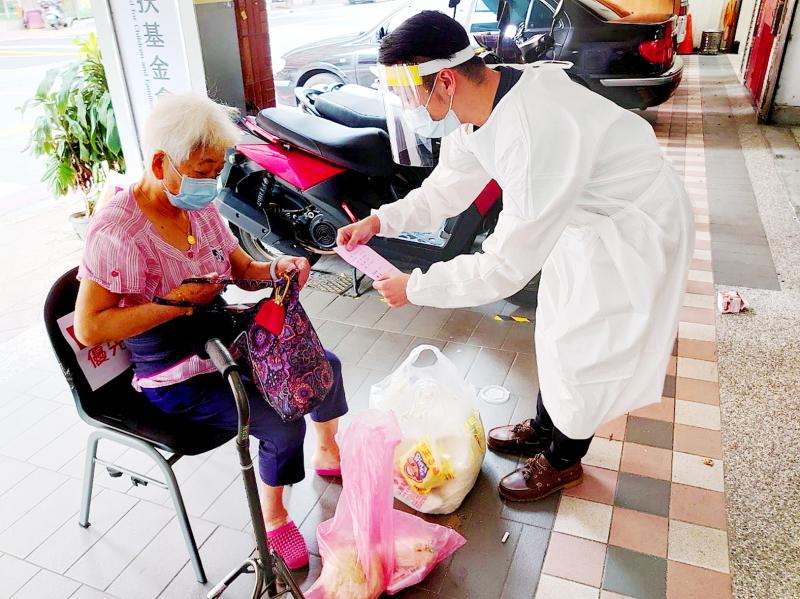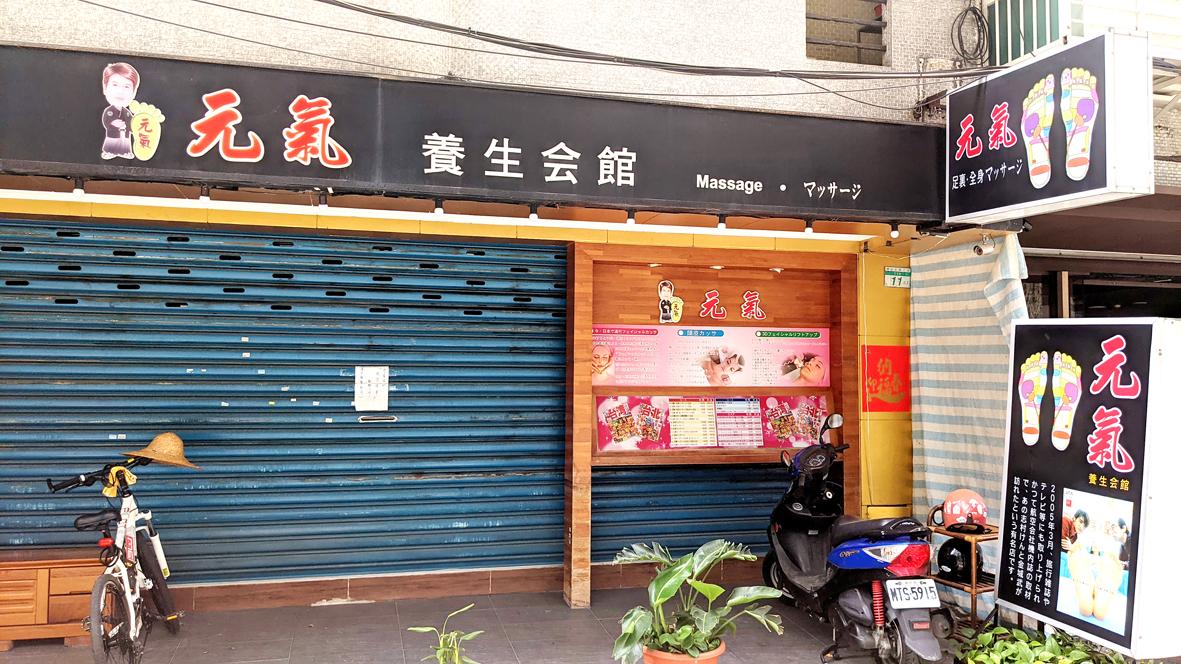With no way to make money during the outbreak and a developmentally delayed third-grader to raise alone, the only thing Mr Lin (林) can do is pray for vaccines.
“I just hope that people can get vaccinated and life can go back to usual soon,” Lin says during a Line interview. “It’s unfortunate that Taiwan’s awkward international status prevents us from getting vaccines.”
A foot masseuse catering to tourists in Taipei, Lin’s income already took a hit when the COVID-19 pandemic hit last year. With the latest outbreak shuttering massage parlors across the nation, he is now out of a job.

Photo courtesy of World Vision
Lin can no longer afford his son Hsiao-feng’s (小峰) daycare service, but he needs it more than ever as in-person classes are suspended. Since he has to watch Hsiao-feng during the day, it is hard for him to look for work. And few are hiring.
Lin is also unsure what else he can do, as he’s in his 50s and has been at his current profession for 15 years.
“I’ve been doing this for so long, I’m good at it and I’ve developed an interest in it,” he says.

Photo courtesy of Taiwan Fund for Children and Families
More than 1,000 families served by the Taiwan Fund for Children and Families are facing a similar predicament since the nationwide level three alert was announced last month. About 38 percent of the families were earning less than NT$20,000 per month, and 46 percent held temporary or service industry jobs that were the first to be hit by the outbreak.
About 68 percent of the non-profit organization’s households are single-parent, which makes it even harder to cope as the children are now all taking classes from home.
Hsiao-mei’s (小玫) mother, for example, had to take unpaid leave from her job at a printing factory to take care of her three kids. Hsiao-hua’s (小華) mother is facing the same situation with four children to look after.

Photo: Han Cheung, Taipei Times
The foundation has provided emergency financial assistance and supplies to these families, and its social workers are trying to help them figure out a feasible long term plan.
“They faced difficulties as soon as businesses closed in mid-May, so we provided immediate financial assistance,“ says social worker Yen Chun-jung (顏君容), who has been working with Lin since Hsiao-feng was diagnosed about six years ago. “After they start receiving government aid, we check with them if it is enough to get by, and discuss what else we can do to help them get through this outbreak.”
Yen says Lin has been very proactive in seeking help and bringing Hsiao-feng to weekly early intervention classes. The child is adjusting well today and by last year he had pretty much caught up to his peers.
“As he grew older, I saw that he was able to make friends, and his development was picking up,” Lin says. “Only then could I relax. It’s been a very tough journey.”
Last year, Lin tried working at a relative’s construction business, but it proved too strenuous and dangerous for someone his age. He quit after suffering a hard fall.
“I thought, my son is still young, and I decided to go back to foot massaging,” Lin says. “It wasn’t much money, but income is income, even though it was scary for me to be in close contact with people during the pandemic.”
Yen is concerned because even if Lin eventually goes back to work, school is not an option for Hsiao-feng as summer vacation approaches.
“He doesn’t have any backup resources and he works at a high-risk job,” Yen says. “We worry about the child if something happens.”
The foundation is also finding ways to ensure that students from low-income families have access to remote learning. Many families have to borrow devices from schools or relatives, and in some cases several children share a parent’s cell phone.
Pei-pei’s (佩佩) family is among the 60.6 percent of families assisted by the foundation that do not have a computer, laptop or tablet. Her father is legally blind and cannot work, while her mother is a hairdresser in a rural salon that charges NT$100 per cut.
Pei-pei and her younger brother use their father’s cell phone to stay connected to school, but it’s hard to complete the exercises and necessary tasks without a proper device. With paying the bills a challenge, the family does not have extra resources to resolve the issue.
The foundation recently participated in the “One Person, One Tablet” drive organized by the Taiwan Mobile Foundation, which within two weeks reached its goal of collecting 619 devices for children like Pei-pei last Sunday.
For more information, visit ccf.org.tw

For many centuries from the medieval to the early modern era, the island port of Hirado on the northwestern tip of Kyushu in Japan was the epicenter of piracy in East Asia. From bases in Hirado the notorious wokou (倭寇) terrorized Korea and China. They raided coastal towns, carrying off people into slavery and looting everything from grain to porcelain to bells in Buddhist temples. Kyushu itself operated a thriving trade with China in sulfur, a necessary ingredient of the gunpowder that powered militaries from Europe to Japan. Over time Hirado developed into a full service stop for pirates. Booty could

Jacques Poissant’s suffering stopped the day he asked his daughter if it would be “cowardly to ask to be helped to die.” The retired Canadian insurance adviser was 93, and “was wasting away” after a long battle with prostate cancer. “He no longer had any zest for life,” Josee Poissant said. Last year her mother made the same choice at 96 when she realized she would not be getting out of hospital. She died surrounded by her children and their partners listening to the music she loved. “She was at peace. She sang until she went to sleep.” Josee Poissant remembers it as a beautiful

Politically charged thriller One Battle After Another won six prizes, including best picture, at the British Academy Film Awards on Sunday, building momentum ahead of Hollywood’s Academy Awards next month. Blues-steeped vampire epic Sinners and gothic horror story Frankenstein won three awards each, while Shakespearean family tragedy Hamnet won two including best British film. One Battle After Another, Paul Thomas Anderson’s explosive film about a group of revolutionaries in chaotic conflict with the state, won awards for directing, adapted screenplay, cinematography and editing, as well as for Sean Penn’s supporting performance as an obsessed military officer. “This is very overwhelming and wonderful,” Anderson

Another moment of the US making permanent concessions for transient gains, which appears to be longstanding US policy with the People’s Republic of China (PRC), occurred last week when President Donald Trump announced that weapons sales to Taiwan would be delayed in order to arrange a meeting with the PRC dictator Xi Jinping (習近平). There were “concerns among some in the Trump administration that greenlighting the weapons deal would derail Trump’s coming visit to Beijing, according to US officials,” the Wall Street Journal reported. It attributed the suspension of the weapons sale to pressure from Xi. While some might shrug